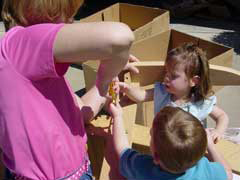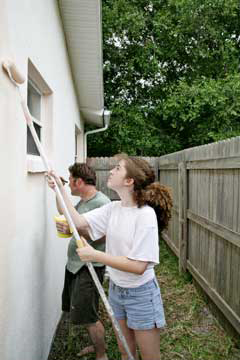
A father begins a Saturday morning with this announcement, “Okay, kids, today we’re going to get out and work in the yard!” Can you imagine the responses he might receive?
Sometimes it can be more difficult to get our children to work than it would be to just do the job on our own. But prophets and researchers alike have long proclaimed the necessity of teaching our children to work. And indeed, “the best teachers of the principle of work are the parents themselves” (President James E. Faust).
LDS researchers have come up with fascinating insights into the redemptive power of family work. Kathleen Bahr and Cheri Loveless argue that work was given to Adam not as a curse; rather, the ground was cursed “’for thy sake’ (Moses 4:23, emphasis added). In other words, the hard work of eating one’s bread ‘by the sweat of thy face’ (vs. 25) was meant to be a blessing” (280).
Till the Soil
Though “there will never be ‘five easy steps’” (Bahr and Loveless 285) to bring about harmonious family work, there are several helpful ideas Bahr and Loveless present that you may want to implement in your own home.
Start with tilling the soil. “Modern prophets have stressed the need to labor with the earth, if only in a small way,” and this is because, as Spencer W. Kimball said, “lessons of life” (286) can be found there.
Take Care with our Attitude
Exemplify the attitudes we want our children to have. If we treat household work as drudgery, we can’t expect much different from our children. “If we wish to hurry and get it out of the way or if we wish we were doing it alone so it could better meet our standards, they will know it” (Bahr and Loveless 286).
When we are cheerful about the work and approach it with a sense of zeal and even fun, we give our children the opportunity to emulate us.
Refuse Technology
Refuse technology that interferes with togetherness. “Deciding which modern conveniences to live with is a personal matter. . . . Before we accept a scientific ‘improvement,’ we should ask ourselves what we are giving up for what we will gain” (Bahr and Loveless 286).
One father traded in his riding lawn mower and purchased five non-electric push mowers with the money, changing a noisy and isolated job into a chance for his family to work together for an hour each Saturday.
Work Side by Side
Work side by side with our children. This is the magic of it all. When we engage in repeated, even mindless tasks, we allow ourselves the opportunity to “focus on one another” (Bahr and Loveless 284).
Not only do these repeated daily tasks offer us time together, but we can’t expect our children to do what we aren’t willing to do ourselves.
When We’re Helping, We’re Happy
It can be almost painful to have a child “help” you with household chores. Mopping a kitchen floor can become twice the job when a five-year-old gets in on it. But most young children naturally want to help Mom and Dad and enjoy mimicking them as they vacuum, weed, or wash out the tub. Seize these opportunities whenever you can, inconvenient though they may be, because the natural inclination to imitate and help might soon give way to the inclination to duck and run whenever housework begins.
You’re Not The Boss...
Avoid a business mentality at home (Bahr and Loveless 287). If we turn ourselves into managers and focus mainly on efficiency and the final product, we might miss the importance of the process. Allow your children the chance to play as they work: the relationships they build are more important than having a perfectly mopped floor.
Fun Work
See if you can create one new opportunity to have your family work together this week. Approach this new task with a sense of fun and focus on the process, rather than being focused on a perfectly finished product.
Insist On It
Insist gently that children help (Bahr and Loveless 286). Children need to feel needed and included in family work. Having children serve each other will help them build closer relationships than if they are only responsible for their own items and areas. You could have your children put away each other’s laundry, or assign two children to work together on cleaning up their bedrooms. Even little children can have important family jobs like folding towels or raking leaves.

Bahr and Loveless explain that work is actually “a natural invitation to become Christ like” (285), and that working together has the “potential to transform lives, to forge strong families, to build strong communities” (280).
Family work can bind us together. It can remove us from our selfishness, and give us a sense of being needed.
As Bahr and Loveless say, “Helping one another nurture children, care for the land, prepare food, and clean homes can bind lives together. This is the power of family work, and it is this power, available in every home, no matter how troubled, that can end the turmoil of the family, begin to change the world, and bring again Zion” (289).
Sources
Bahr, Kathleen Slaugh, and Cheri A. Loveless. “Family Work.” Brigham Young Magazine Spring 2000: 24-34. Rpt. in Readings for Intensive Writers Ed. Susan T. Laing. 4th ed. Boston: Pearson Publishing Company, 2005. 278-290.
Faust, James E. “First Presidency Message: A Thousand Threads of Love.” Ensign October (2005): 3.